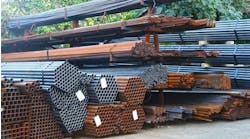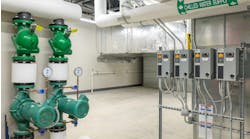Latest from Home
Sponsored
By BOB MIODONSKI
Of CONTRACTOR’s staff
NEW ORLEANS — Carbon monoxide testing may seem to be beyond the realm of work performed by plumbing contractors, but Paul Nebrasky begs to differ.
Nebrasky presented his “Carbon Monoxide Testing for Safety and Profit” workshop Feb. 20 at the Quality Service Contractors’ Power Meeting XVIII meeting here. QSC is a subgroup of the Plumbing-Heating-Cooling Contractors - National Association.
“Testing for carbon monoxide gave us a major point-of-difference from our competitors,” said Nebrasky, a QSC member and owner of Paul Nebrasky Plumbing, Heating & Cooling in New York. He noted that faulty water heaters are the No. 1 emitter of carbon monoxide among major appliances.
Working with the National Comfort Institute in Sheffield Lake, Ohio, Nebrasky has trained and certified all technicians in the 31-employee company. He said his company was the first plumbing-and-HVAC company in New York State to be a certified carbon monoxide analyst. The company, founded in 1988, added HVAC work in 1997.
New York, New Jersey and many other states have enacted laws stating that carbon monoxide detectors be installed in every new home, Nebrasky said. The reason for the legislation was made clear by headlines of news stories of CO-related deaths, which Nebrasky presented to QSC members.
Even with legal requirements in place, service companies need to have a marketing plan to get the message about testing for CO out to consumers. Nebrasky’s marketing plan details the company’s objectives, strategies and target audiences.
Objectives, for example, are to continue to bring in leads and business from current markets and customers; to bring in leads and business from new markets to grow the business; and continue to bring in leads for new products and services.
Nebrasky’s marketing includes service agreements, advertising in the Yellow Pages and local newspapers, appearances at home shows, and referrals from utility companies and fire departments.
“Service agreements are the most important way to market carbon monoxide testing,” said Nebrasky, whose company has more than 1,000 such agreements. “More people want to get carbon monoxide testing than they do getting their furnace checked.”
Nebrasky showed QSC members a variety of his newspaper advertising. One of the ads features coupons for service and installation work. His most effective ad, he said, featured a child next to the headline, “Just one of the many reasons to get your home checked for carbon monoxide.”
Along with booths at home shows and town festivals, Nebrasky also distributes handouts to homeowners. One such handout answers frequently asked questions about carbon monoxide alarms, such as “Do I need a carbon monoxide alarm if I have my equipment serviced every year?” and “What is the best alarm to buy?”
Letting the local gas utility and fire department know that your company tests for CO can result in referrals from both.
Nebrasky also promotes CO testing on the message that customers hear while on hold on the telephone. In addition, the company uses economical, 10-second spots on the radio.
“They’re inexpensive ads because the they only run during school closings when it snows,” Nebrasky said.
Local TV stations and newspapers may be interested in news stories related to CO testing, he said. So, his company issues press releases on the subject.
Nebrasky Plumbing, Heating & Cooling has generated profits from CO testing and writing more service agreements. But the primary motivation for CO testing, Nebrasky said, is to save lives.
The company sends out service evaluation forms to customers. Nebrasky showed QSC members the comments of one grateful customer who wrote that the firm’s work “probably saved my life and the life of my pet cockatoo, Dexter, and (we) both thank you.”

